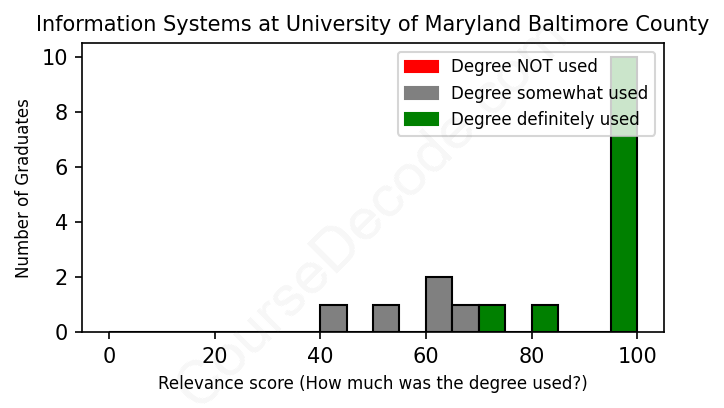
First, some facts. Of the Information Systems graduates from University of Maryland Baltimore County we've analyzed , here's how many have used (or NOT used) their degree in their career:

These are estimates based on AI analysis of 17 LinkedIn profiles (see below).
The verdict? Significantly above average. Overall, with an average relevance score of 83%, Information Systems graduates from University of Maryland Baltimore County have a much higher likelihood (+16%) of finding work in this field compared to the average graduate across all fields:
And for comparison, here's the chart for all profiles we've looked at across all degrees.
Also, after graduating, only 11% of these graduates have pursued further education other than another Bachelor's degree (such as a Masters degree or other), compared to the average across all profiles of 35%. This suggests a Bachelors degree is enough for most Information Systems graduates, and it's normal to look for work straight after graduation.
See the details:
|
Relevance score: 100% We think this person has gone into a career highly relevant to their degree. We think this person has gone into a career highly relevant to their degree.
DEGREE INFOGraduated in 2016 from University of Maryland Baltimore County with a Bachelor's Degree in Information Systems. No other secondary education since. JOB HISTORY SINCE GRADUATIONSystems Technician GEICO Jun 2016 - Jun 2019 System Engineer  GEICO Jun 2019 - Present ABOUTNo information provided. |
The top 10 most common jobs done by the graduates we've analyzed (ranked most common to least) are:
When looking at the job roles held by graduates from the Information Systems program at the University of Maryland Baltimore County, it becomes clear that many end up in positions that are relatively aligned with their degree. A significant number of graduates secure roles like Programmer Analyst, Software Engineer, and System Engineer, which pretty much require the technical skills and knowledge that are core to Information Systems. These positions involve creating, analyzing, and managing software and systems, which is what the degree equips them to do best.
However, not all job paths taken by graduates are strictly related to Information Systems. Some students take on roles that are more administrative or in completely different fields, like sales or basic clerical jobs, which don’t really utilize the technical skills they learned. While internships and assistant positions often provide a good starting point, many of these roles don’t apply the advanced concepts of Information Systems. Overall, while there's a healthy representation in relevant job fields, there are definitely some paths that stray away from the main focus of their education. It really depends on how graduates leverage their skills in the job market and the type of roles they choose to pursue after finishing their studies.
Here is a visual representation of the most common words in job titles for Information Systems graduates (this is across all Information Systems graduates we've analyzed, not just those who went to University of Maryland Baltimore County):

Graduates from the University of Maryland Baltimore County with a degree in Information Systems seem to follow some solid career trajectories, especially if you look at their first jobs after graduating and where they've moved a few years later. Many graduates kick off their careers with roles like Programmer Analyst or Software Engineer, typically snagging jobs at reputable companies in the tech space such as T. Rowe Price and Leidos. For instance, someone who graduated in 2011 started as an intern and worked their way up to a Senior Programmer Analyst at T. Rowe Price by 2016. That's a great example of how these degrees can lead to steady progression in the field right away, which is super encouraging for new graduates.
Fast forward five to ten years, and you see quite a few graduates holding impressive titles like Senior Software Engineer, Senior Consultant, and System Engineer, which shows that the field enables career advancement and specialization. However, there are some outliers where graduates took routes that seem less connected to Information Systems, like moving into administrative or support roles. That said, the overall picture is promising—most alumni appear to remain within the tech realm, continuing to grow their skills and influence in industries that really value tech expertise. So, if you're considering a path in Information Systems, there’s a good chance you can find a relevant and fulfilling career that offers opportunities for growth down the line!
Getting a Bachelor’s degree in Information Systems at UMBC can be a bit of a mixed bag—it's neither super easy nor ridiculously hard, but it definitely has its challenging moments. You’ll dive into stuff like programming, databases, and systems analysis, which can be tricky if you're not into math or tech. But if you have a genuine interest in technology and enjoy solving problems, you’ll find it pretty manageable. There are also plenty of resources like study groups and tutoring, so if you stay on top of your assignments and ask for help when you need it, you should do just fine. Overall, it’s a solid program that can push you, but it’s not overwhelming if you keep at it.
Most commonly, in the LinkedIn profiles we've looked at, it takes people 4 years to finish a Bachelor degree in Information Systems.
Looking at these UMBC graduates, it seems like a mixed bag when it comes to their earnings. Those who graduated earlier, like the ones from 2011 and 2012, are pretty well-set, especially the senior roles at T. Rowe Price and Salient CRGT – they’re likely raking it in with some decent salaries and benefits. On the other hand, some of the more recent grads, particularly those with roles like "Office Clerk" and internships, might not be pulling in the big bucks just yet. Still, a lot of them have jumped into positions at well-known companies like Leidos and Northrop Grumman, which usually means good pay will come down the road. Overall, if they keep climbing the career ladder, most of these folks should eventually end up doing alright financially.
Here is a visual representation of the most common words seen in the "about" section of LinkedIn profiles who have a Bachelor degree in Information Systems (this is across all Information Systems graduates we've analyzed, not just those who went to University of Maryland Baltimore County). This may or may not be useful:

Here are all colleges offering a Bachelor degree in Information Systems (ordered by the average relevance score of their Information Systems graduates, best to worst) where we have analyzed at least 10 of their graduates:
| College | Score | Count |
|---|---|---|
 Brigham Young University Brigham Young University
|
84 | 10 |
 University of Maryland Baltimore County University of Maryland Baltimore County
|
83 | 17 |